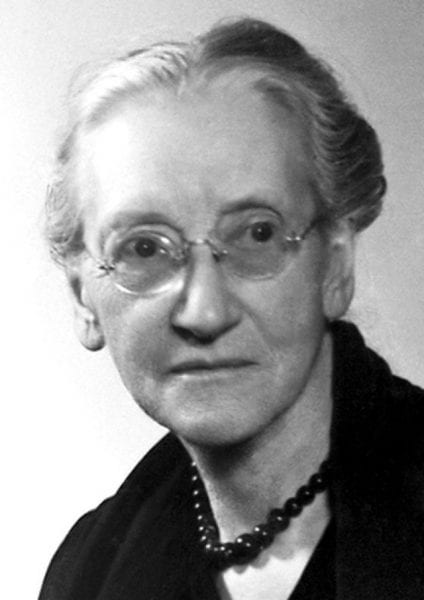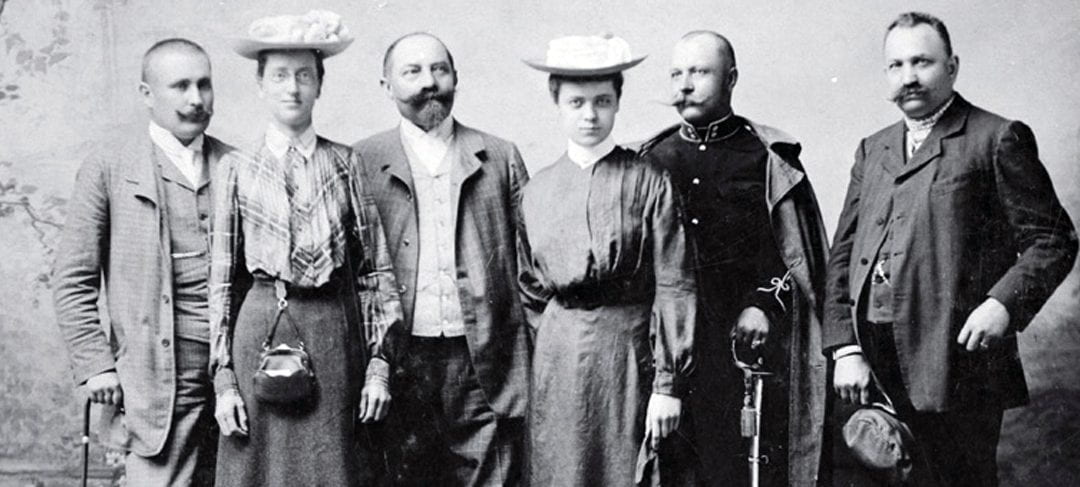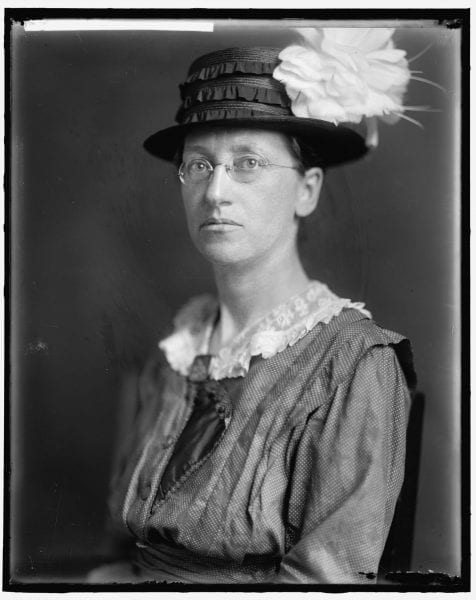Emily Greene Balch reached several achievements throughout her career as an American pacifist, economist, and sociologist. Born on January 8th, 1867, in Boston, Massachusetts to a prosperous family that was embedded within the supporting party of Abraham Lincoln during the civil war. This caveat served as an early environment for Balch’s understanding of racial justice and equality. (1) These precedent family beliefs and view of the civil war, created the foundation for Emily Greene Balch’s ideology regarding ‘global citizenship’ and her studies of immigration. Her studies led to the publication of Our Slavic Fellow Citizens along with Public Assistance of the Poor in France, which illustrated the usage of statistical techniques for comparative analysis of immigrant life in both Europe and America.
She was a member of Bryn Mawr’s first graduating class of 1889, then pursued further education by traveling to Paris and Berlin, along with spending time at the University of Chicago. At the very beginning of her career, Balch devoted herself to what she called “the real business of our time, the realization of a more satisfactory economic order”. (2) This entailed the goal of breaking down class barriers that were economically facilitated while also assisting the poor with social services and education. Balch practiced her statements, by founding the settlement house in Boston known as Denison House and working as a professor of economics at Wellesley. She joined Wellesley College in 1896 and rose to the rank of professor of economics and sociology in 1913. During her time, as a professor, Balch was known to be a champion for the underprivileged and insisted that her own students could formulate their own independent judgements. Her own beliefs led to her participation in movements regarding racial justice, control of child labor, improved wages, and women’s suffrage, while also formulating the production of ‘Our Slavic Fellow Citizens’. Her aptitude for humanitarian topics was the reason for her helping found the Denison House, but also the reason why she decided to take a sabbatical once World War I started. The topic of peace was always of importance to Balch, which was illustrated by her involvement at the previous peace conferences at The Hague.

Emily Greene Balch. Source: Wikimedia Commons (Public Domain)
However, once World War I began her priority shifted rapidly, she decided to take a sabbatical from Wellesley and pursued a position at the International Congress of Women in 1915, with the goal of assisting humanity with moving away from the general concept of war. The onset of world war pushed Emily Greene Balch further to the left wing as a notorious pacifist, which further added fuel to the development of her beliefs regarding ‘global citizenship’. With her involvement at the International Congress of Women, led to the foundation of the Women’s International League for Peace and Freedom (WILPF), along with many other reputable women such as Jane Addams. Balch played various pivotal roles during her time at WILPF, such as preparing peace proposals for warring nations, along with serving as delegation (sponsored by Congress) to Scandinavian countries and Russia, to urge initiative mediation offers. (3)
Balch shared a common variable of internationalism across her life’s work from being a professor to being an active pacifist during war. Her entire ideology was based on ‘global citizenship’, Balch’s personal ideas were the product of learning the necessity of cooperation across borders and nationalistic loyalties. (4) Global citizenship is known to be the idea that one’s identity is not constrained by geography or politics, and that responsibilities are derived from being part of the broader class of humanity. (5) Through her time as a social reformer across various levels ranging from local to international, Balch came to the consensus that human similarities must be prioritized over national differences. This is also analogous to the idea of having a collective conscious across humanity through empathy and a united form of understanding. Balch’s fundamental study for peace and overall sociology, was derived and influenced by Hull House’s approach to understanding society by utilizing a humanitarian lens instead of simply using a monotonous laboratory setting as many male sociologists did. By diving into the humanitarian aspect of studies, many components of society were no longer overlooked due to the infusion of subjectivity and objectivity methods. As mentioned, in Addams’ Democracy and Social Ethics, we would be hindering our scope of knowledge by limiting our understanding about society by not “putting ourselves in other people’s shoes”. (6) This understanding of society, is a driving component for Balch’s emphasis on global citizenship and internationalism, along with the reason why Balch took after and looked up to Jane Addams. In 1922, Balch declared for all women across the globe to reach beyond national allegiances and develop a new human identity, global citizenship. She declared the emergence of a new generation of women, writing: “Lovers of our own lands, we are citizens of the world, conscious partakers in the sacrament of all human life”. She embraced a global identity, by stating: “Deeply and happily, I feel myself a citizen of the world. I am at home wherever there are people”. (7)
Balch’s utilization of empathy to overcome strict objectivity was not only highlighted through internationalism and global citizenship, but also her work regarding immigration. Within Our Slavic Fellow Citizens, Balch fused quantitative and qualitative data to give an insight on Slavic immigration, while also refuting ideas that stemmed from American nativism. The publication of her work was groundbreaking due to the depth of the research, but also because of the insights regarding immigration and the conflicting nationalities that were originated within the Austro-Hungarian Empire. A sense of foreshadowing about the upcoming World War occurring in Europe, was illustrated by Balch’s understanding for immigration within the region. Many individuals fled for reasons that ranged from political to economic interests, however, nationalism was a component that one was unable to get away from despite the country. To tackle on the issue of nativism and anti-immigration, Balch utilized both qualitative and quantitative information to give insight on the importance of immigration. This allowed her to focus on the strengths of both empirical conclusions inform her audience in a manner that wasn’t attacking anyone’s ideology, but instead informing them. She stated that the goal of her study was “in the social character and consequences of the emigration in question”. (8)
By having an interest in both the individuals and trends, she was able to grasp an understanding of contributing factors to immigration, while also showing how these immigrants interacted with and affected the United States. Reasons for the cause of immigration varied across Slavic groups, such as animosity among cultures that stemmed from a distinction of languages and land fueling the disputes of nationalities and kinship. However, the rapid changes in economies left many groups to take part in poverty-stricken environments due to the structural employment that was created. Shifting from mainly agricultural to a mainly industrial economy, left many individuals without jobs at the end of feudal serfdom within various regions. Meanwhile, the interactions of immigrants with the United States typically consisted at first of Slavic men venturing on their own to send money to their family, but as time went on, entire families began to immigrate and permanently stayed in the United States. Balch’s observation of the uptick in Slavic families becoming immigrants in the United States, was an early viewing of globalization. A factor that went together with the ideals of global citizenship, however, the loss of culture through assimilation was a factor that diminished the benefits of globalization because of Balch’s personal awe at Slavic culture. Balch stated, “Civilization of the prevailing type is becoming planetary”, indicating that a planetary civilization that entails an interconnected world will be the desired to create peace and have a united society at the cost of culture preservation. (10)
Balch utilized quantitative methods to gather data on the roles that immigrants took up when coming to the United States. Most immigrants as stated beforehand were leaving an economy that had shifted to industrialization which rendered their farming skills to be less desired. Meanwhile, the United States federal government actively engaged with immigrants due to their demand for farmers in the 1880s. After 1880s, the number of farmer related immigrants began to decrease and filter towards the mining industry. Even though there was a shift in the jobs that Slavic immigrants occupied, nativist ideas were disproved because Balch showcased the abundance of needed labor within these respective industries did not affect the American wage standard. (11) Most of these facts that were deprived from her usage of quantitative methods illustrated immigration regarding Slavic men, however, Balch also took on a perspective regarding the women through her personal empirical observations. She came to view the social value of women to be greater than men because of the small ratio of women within immigrants (one third), and their role within households as wives and mothers. Overall, Our Slavic Fellow Citizens entailed an understanding of immigrant life, tailored towards nativist fueled Americans with the illustration of the idea that immigrants were their equals. This understanding was also overtly showcased by the usage of fellow and citizens within Balch’s title decision. Even though the publication of this text was prior to the beginning of the carnage that was brought upon by World War I, Balch’s emphasis of equality within the text can be indicated to be her beginning step towards embracing global citizenship.
Emily described herself as “only the plainest of New England spinsters and ex-teachers”, however, the culmination of her efforts spearheaded many initiatives throughout the war that lead up to her Nobel Peace Prize in 1946. (12) Over the course of Balch’s life, through her professional work and scholarly writings, she continually advanced the concept of global citizenship as the path to peace. This idea remained a constant driving force in her life and is a central element of her legacy. Balch’s place in history tends to be obscure unlike Addams because of Balch’s tendency to be an identity that worked behind the scenes, versus being in the public eye. Furthermore, Addams being the first woman to receive the Nobel prize, led to anyone after her being solely compared versus receiving praise. Despite the distinct characteristics between both women, Balch made her own impact across the world even if it seemed undermined by history, the prevalence of internationalism and her pacifist ideology is important within our current society.
About the Author:
Ismael Carreno is a third-year double majoring in Economics and Astrophysics at the University of Chicago. Extracurriculars regarding UChicago consist of The Blue Chips, OLAS, and AKPsi. Outside of school, he enjoys soccer, traveling, reading about Web 3.0 and a good steak. He plans to pursue a role in venture capital specializing in Web 3.0 technology after graduation.
References:
Featured Image: Emily Greene Balch (second from the left, others unidentified) in Hungary, c. 1900 from the Papers of Emily Greene Balch, Swarthmore College Peace Collection.
(1) (john@spartacus-educational.com), J. S. (n.d.). Spartacus Educational. Retrieved December 9, 2021, from https://spartacus-educational.com/USAWbalch.htm
(2) A Woman of Peace. A Woman of Peace | Bryn Mawr Alumnae Bulletin. (n.d.). Retrieved December 9, 2021, from https://www.brynmawr.edu/bulletin/woman-peace
(3) The Nobel Peace Prize 1946. NobelPrize.org. (n.d.). Retrieved December 9, 2021, from https://www.nobelprize.org/prizes/peace/1946/balch/biographical/
(4) Emily Greene Balch. Deutsche Website. (n.d.). Retrieved December 9, 2021, from https://www.fembio.org/english/biography.php/woman/biography/emily-greene-balch/
(5) What is global citizenship. Oxfam GB. (n.d.). Retrieved December 10, 2021, from https://www.oxfam.org.uk/education/who-we-are/what-is-global-citizenship/
(6) Addams, J. (1967). Democracy and social ethics. Belknap Press of Harvard Univ. Press.
(7) Emily Greene Balch. Deutsche Website. (n.d.). Retrieved December 9, 2021, from https://www.fembio.org/english/biography.php/woman/biography/emily-greene-balch/
(8) Balch, E. G. (2010). In Our Slavic fellow citizens (p. 6). essay, General Books.
(9) Balch, E. G. (2010). In Our Slavic fellow citizens (p. 87–167). essay, General Books.
(10) Balch, E. G. (2010). In Our Slavic fellow citizens (p. 58). essay, General Books.
(11) Balch, E. G. (2010). In Our Slavic fellow citizens (p. 282). essay, General Books.
(12) A Woman of Peace. A Woman of Peace | Bryn Mawr Alumnae Bulletin. (n.d.). Retrieved December 9, 2021, from https://www.brynmawr.edu/bulletin/woman-peace


